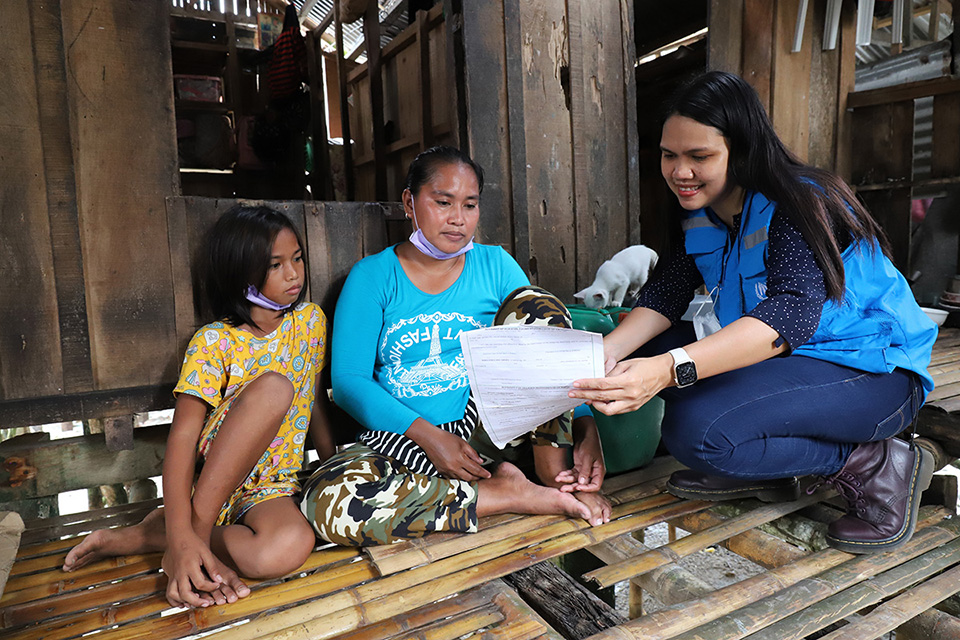
Your support helps ensure that populations at risk of statelessness are able to obtain birth documentation, safeguarding their rights and bridging their access to social services such as education and healthcare. © UNHCR/Jorica Pamintuan
When Arsida Basari enrolled her daughter—also named Arsida—in elementary school, the teacher asked for the child’s birth certificate, the most basic form of civil documentation in the Philippines. However, like many members of the Sama Bajau indigenous group that she belongs to, Arsida had not been able to secure a certificate of live birth when her daughter was born.
“The teacher told me that I had to submit the birth certificate within three months or Arsida wouldn’t be allowed to proceed with her schooling,” Arsida said.
Many Sama Bajau face similar barriers to education, employment and access to healthcare and other social services due to their lack of civil documentation. The group’s itinerant lifestyle, coupled with generations of non-registration of births, has put them at risk of being stateless.
Without proof of legal identity, they encounter problems when enrolling their children in school, applying for certain jobs, and even traveling to some areas outside of their communities.
Undeterred by the school’s rules, Arsida asked if her daughter could start going to classes anyway, promising to send them the birth certificate when she is able to get it. As someone who never attended school, she was determined to ensure her child is able to attain an education.
“I hope she can learn how to write so that she won’t end up like me,” Arsida said, adding, “Maybe once she learns, she can help me one day.”
Awareness of the importance of the birth certificate has been on the rise among the Sama Bajau – not only because the document is increasingly being required to access critical services, but also thanks to the efforts of government agencies and community volunteers who advocate for birth registration.
The Philippine Government identified the Sama Bajau as a population at risk of statelessness in 2011, and has since taken steps to address the issue through the implementation of a National Action Plan to End Statelessness by 2024.
For the Sama Bajau in Mindanao, interventions have included educating communities about the need for civil documentation, easing the process and costs of birth registration, and improving the digitization capacities of local civil registrars.
Arsida was able to secure her own birth certificate for free in 2021, but wasn’t able to register her daughter through the same program because she wasn’t born in the municipality holding the birth registration activity.
Going through the normal process for delayed registration was not an option because she couldn’t afford to cover the costs.
“When I would get paid, we could eat. It was just enough for food, so I could not stretch the money to get [my child] a birth certificate,” she said.
So, Arsida has been waiting for the opportunity to register her daughter to arise and finally, on 20 September 2022, the younger Arsida was one of 463 Sama Bajau who received their birth certificates as part of the latest batch of participants in UNHCR’s birth registration initiative, organized in partnership with the Ministry of Social Services and Development (MSSD) of the Bangsamoro region, UNICEF, and the local government of Patikul, Sulu.
Flushed with happiness, Arsida said, “I won’t have to worry anymore. If someone asks for [my daughter’s birth certificate], I have something to show now.”
With her newly issued proof of legal identity, young Arsida can stay in school to begin her journey towards achieving her dream of becoming a teacher – a profession she chose so she can help teach her mother someday.
***
Since 2019, UNHCR has helped over 3,000 Sama Bajau and unregistered children within the context of forced displacement due to armed conflict secure their birth certificates. This year’s birth registration activities focused primarily on the island provinces of the Bangsamoro (Basilan, Sulu, Tawi-Tawi), which have been plagued by recurring conflict and cyclical displacement for decades.
Through the #IBelong Campaign to End Statelessness and the UNHCR-UNICEF Joint Strategy for Addressing Childhood Statelessness, UNHCR hopes to help individuals like Arsida obtain birth documentation, and in the process, access opportunities that will allow them to build better futures for themselves and their communities.
Share on Facebook Share on Twitter